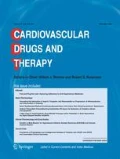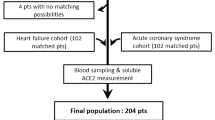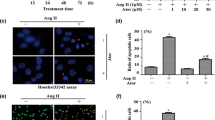Abstract
Aim
An imbalance between endothelial apoptosis and regeneration is one of the initiating events in atherosclerosis. Angiotensin-converting enzyme (ACE) inhibition corrects the endothelial dysfunction observed in coronary artery disease, and this could be the consequence of a reduction in the rate of endothelial apoptosis. The aim of this study was to investigate the effect of different ACE inhibitors on endothelial apoptosis.
Methods
We examined the effect of five ACE inhibitors (enalapril, perindopril, quinapril, ramipril, and trandolapril) on the rate of endothelial apoptosis, either in vitro in human umbilical vein endothelial cells (HUVECs), using a serum deprivation method to induce apoptosis, or in vivo in rats, inducing apoptosis via endotoxic shock with Escherichia coli lipopolysaccharides (LPS).
Results
We were unable to detect any significant effect of ACE inhibition on the rate of in vitro endothelial apoptosis at concentrations ranging from 5 × 10−8 to 10−6 M. In contrast, chronic in vivo administration of ACE inhibitors to rats at dosages that had similar hypotensive effects reduced the rate of LPS-induced apoptosis significantly for perindopril (P < 0.001) and nonsignificantly for the other ACE inhibitors. The order of potency of the ACE inhibitors tested was perindopril > ramipril ≫ quinapril = trandolapril = enalapril, with significant differences between perindopril and quinapril (P < 0.01), trandolapril (P < 0.001), and enalapril (P < 0.001). The difference between perindopril and ramipril did not reach significance.
Conclusion
Our experiments suggest differences between ACE inhibitors in terms of inhibition of endothelial apoptosis in vivo.
Similar content being viewed by others
Abbreviations
- ACE:
-
angiotensin-converting enzyme
- EC:
-
endothelial cell
- eNOS:
-
endothelial nitric oxide synthase
- HUVEC:
-
human umbilical vein endothelial cell
- LPS:
-
lipopolysaccharides
- NO:
-
nitric oxide
- PHS:
-
pooled human serum
- RAEC:
-
rat aortic endothelial cell
- SBP:
-
systolic blood pressure
References
Buemi M, Corica F, Marino D, et al. Cardiovascular remodeling, apoptosis, and drugs. Am J Hypertens. 2000;13:450–4.
Falk E. Pathogenesis of atherosclerosis. J Am Coll Cardiol. 2006;47:C7–12.
The European Reduction Of cardiac events with Perindopril in stable coronary Artery disease Investigators. Efficacy of perindopril in reduction of cardiovascular events among patients with stable coronary artery disease: randomised, double-blind, placebo-controlled, multicentre trial (the EUROPA study). Lancet. 2003;362:782–8.
Bertrand ME. Provision of cardiovascular protection by ACE inhibitors: a review of recent trials. Curr Med Res Opin. 2004;20:1559–69.
Ceconi C, Fox KM, Remme WJ, et al. ACE inhibition with perindopril and endothelial dysfunction. Results of a substudy of the EUROPA study: PERTINENT. Cardiovasc Res. 2007;73:237–46.
Moncada S, Palmer RM, Higgs EA. Nitric oxide: physiology, pathophysiology, and pharmacology. Pharmacol Rev. 1991;43:109–42.
Moncada S, Higgs A. The l-arginine-nitric oxide pathway. N Engl J Med. 1993;329:2002–12.
Varin R, Mulder P, Tamion F, et al. Improvement of endothelial function by chronic angiotensin-converting enzyme inhibition in heart failure: role of nitric oxide, prostanoids, oxidant stress, and bradykinin. Circulation. 2000;102:351–6.
Ohashi H, Takagi H, Oh H, et al. Phosphatidylinositol 3-kinase/Akt regulates angiotensin II-induced inhibition of apoptosis in microvascular endothelial cells by governing survivin expression and suppression of caspase-3 activity. Circ Res. 2004;94:785–93.
Takahashi T, Taniguchi T, Konishi H, Kikkawa U, Ishikawa Y, Yokoyama M. Activation of Akt/protein kinase B after stimulation with angiotensin II in vascular smooth muscle cells. Am J Physiol. 1999;276:H1927–H1934.
Li W, Ye Y, Fu B, et al. Genetic deletion of AT2 receptor antagonizes angiotensin II-induced apoptosis in fibroblasts of the mouse embryo. Biochem Biophys Res Commun. 1998;250:72–6.
Cigola E, Kajstura J, Li B, Meggs LG, Anversa P. Angiotensin II activates programmed myocyte cell death in vitro. Exp Cell Res. 1997;231:363–71.
Bhaskaran M, Reddy K, Radhakrishanan N, Franki N, Ding G, Singhal PC. Angiotensin II induces apoptosis in renal proximal tubular cells. Am J Physiol Renal Physiol. 2003;284:F955–F965.
Pollman MJ, Yamada T, Horiuchi M, Gibbons GH. Vasoactive substances regulate vascular smooth muscle cell apoptosis. Countervailing influences of nitric oxide and angiotensin II. Circ Res. 1996;79:748–56.
Kakinuma Y, Hama H, Sugiyama F, Goto K, Murakami K, Fukamizu A. Anti-apoptotic action of angiotensin fragments to neuronal cells from angiotensinogen knock-out mice. Neurosci Lett. 1997;232:167–70.
Nakamura M, Tanaka M, Abe S, Fujiwara H. Sudden pressure elevation can trigger acute muscle cell death of the heart and aorta. Atherosclerosis. 1999;146:25–32.
Tea BS, Dam TV, Moreau P, Hamet P, deBlois D. Apoptosis during regression of cardiac hypertrophy in spontaneously hypertensive rats. Temporal regulation and spatial heterogeneity. Hypertension. 1999;34:229–35.
Otani A, Takagi H, Suzuma K, Honda Y. Angiotensin II potentiates vascular endothelial growth factor-induced angiogenic activity in retinal microcapillary endothelial cells. Circ Res. 1998;82:619–28.
Dimmeler S, Rippmann V, Weiland U, Haendeler J, Zeiher AM. Angiotensin II induces apoptosis of human endothelial cells. Protective effect of nitric oxide. Circ Res. 1997;81:970–6.
Akishita M, Nagai K, Xi H, et al. Renin-angiotensin system modulates oxidative stress-induced endothelial cell apoptosis in rats. Hypertension. 2005;45:1188–93.
Frey EA, Finlay BB. Lipopolysaccharide induces apoptosis in a bovine endothelial cell line via a soluble CD14 dependent pathway. Microb Pathog. 1998;24:101–9.
Hotchkiss RS, Tinsley KW, Swanson PE, Karl IE. Endothelial cell apoptosis in sepsis. Crit Care Med. 2002;30:S225–S228.
Yang Z, Breider MA, Carroll RC, Miller MS, Bochsler PN. Soluble CD14 and lipopolysaccharide-binding protein from bovine serum enable bacterial lipopolysaccharide-mediated cytotoxicity and activation of bovine vascular endothelial cells in vitro. J Leukoc Biol. 1996;59:241–7.
Arditi M, Zhou J, Dorio R, Rong GW, Goyert SM, Kim KS. Endotoxin-mediated endothelial cell injury and activation: role of soluble CD14. Infect Immun. 1993;61:3149–56.
Bannerman DD, Goldblum SE. Mechanisms of bacterial lipopolysaccharide-induced endothelial apoptosis. Am J Physiol Lung Cell Mol Physiol. 2003;284:L899–L914.
Jaffe EA, Nachman RL, Becker CG, Minick CR. Culture of human endothelial cells derived from umbilical veins. Identification by morphologic and immunologic criteria. J Clin Invest. 1973;52:2745–56.
Kwak HJ, So JN, Lee SJ, Kim I, Koh GY. Angiopoietin-1 is an apoptosis survival factor for endothelial cells. FEBS Lett. 1999;448:249–53.
Comini L, Bachetti T, Cargnoni A, et al. Therapeutic modulation of the nitric oxide pathway: are all ACE inhibitors equivalent. Pharmacol Res. 2007;56:42–8.
Kim I, Kim HG, So JN, Kim JH, Kwak HJ, Koh GY. Angiopoietin-1 regulates endothelial cell survival through the phosphatidylinositol 3'-Kinase/Akt signal transduction pathway. Circ Res. 2000;86:24–9.
Dzau VJ, Bernstein K, Celermajer D, et al. Pathophysiologic and therapeutic importance of tissue ACE: a consensus report. Cardiovasc Drugs Ther. 2002;16:149–60.
Remme WJ. Prevention of cardiovascular events by perindopril in patients with stable coronary disease does not depend on blood pressure and its reduction—results from the EUROPA study. Circulation. 2004;110:III628Abstract.
Comini L, Boraso A, Bachetti T, et al. Effects of endotoxic shock on neuronal NOS and calcium transients in rat cardiac myocytes. Pharmacol Res. 2005;51:409–17.
Ceneviva GD, Tzeng E, Hoyt DG, et al. Nitric oxide inhibits lipopolysaccharide-induced apoptosis in pulmonary artery endothelial cells. Am J Physiol. 1998;275:L717–L728.
Tzeng E, Billiar TR. Nitric oxide and the surgical patient. Identifying therapeutic targets. Arch Surg. 1997;132:977–82.
Miyoshi M, Nagata K, Imoto T, Goto O, Ishida A, Watanabe T. ANG II is involved in the LPS-induced production of proinflammatory cytokines in dehydrated rats. Am J Physiol Regul Integr Comp Physiol. 2003;284:R1092–R1097.
Luo SF, Wang CC, Chiu CT, et al. Lipopolysaccharide enhances bradykinin-induced signal transduction via activation of Ras/Raf/MEK/MAPK in canine tracheal smooth muscle cells. Br J Pharmacol. 2000;130:1799–808.
Yin H, Chao L, Chao J. Kallikrein/kinin protects against myocardial apoptosis after ischemia/reperfusion via Akt-glycogen synthase kinase-3 and Akt-Bad.14-3-3 signaling pathways. J Biol Chem. 2005;280:8022–30.
Dimmeler S, Zeiher AM. Nitric oxide—an endothelial cell survival factor. Cell Death Differ. 1999;6:964–8.
Fujita N, Manabe H, Yoshida N, et al. Inhibition of angiotensin-converting enzyme protects endothelial cell against hypoxia/reoxygenation injury. Biofactors. 2000;11:257–66.
Kim YM, Kim TH, Seol DW, Talanian RV, Billiar TR. Nitric oxide suppression of apoptosis occurs in association with an inhibition of Bcl-2 cleavage and cytochrome c release. J Biol Chem. 1998;273:31437–41.
Kim YM, Talanian RV, Billiar TR. Nitric oxide inhibits apoptosis by preventing increases in caspase-3-like activity via two distinct mechanisms. J Biol Chem. 1997;272:31138–48.
Li J, Bombeck CA, Yang S, Kim YM, Billiar TR. Nitric oxide suppresses apoptosis via interrupting caspase activation and mitochondrial dysfunction in cultured hepatocytes. J Biol Chem. 1999;274:17325–33.
Mohr S, Zech B, Lapetina EG, Brune B. Inhibition of caspase-3 by S-nitrosation and oxidation caused by nitric oxide. Biochem Biophys Res Commun. 1997;238:387–91.
Melino G, Bernassola F, Knight RA, Corasaniti MT, Nistico G, Finazzi-Agro A. S-nitrosylation regulates apoptosis. Nature. 1997;388:432–3.
Rossig L, Fichtlscherer B, Breitschopf K, et al. Nitric oxide inhibits caspase-3 by S-nitrosation in vivo. J Biol Chem. 1999;274:6823–6.
Li J, Billiar TR, Talanian RV, Kim YM. Nitric oxide reversibly inhibits seven members of the caspase family via S-nitrosylation. Biochem Biophys Res Commun. 1997;240:419–24.
Liu L, Stamler JS. NO: an inhibitor of cell death. Cell Death Differ. 1999;6:937–42.
Ceconi C, Francolini G, Olivares A, Comini L, Bachetti T, Ferrari R. Angiotensin-converting enzyme (ACE) inhibitors have different selectivity for bradykinin binding sites of human somatic ACE. Eur J Pharmacol 2007 DOI 10.1016/j.ejphar.2007.07.061
Yu W, Akishita M, Xi H, et al. Angiotensin converting enzyme inhibitor attenuates oxidative stress-induced endothelial cell apoptosis via p38 MAP kinase inhibition. Clin Chim Acta. 2006;364:328–34.
Galvez AS, Fiedler JL, Ocaranza MP, Jalil JE, Lavandero S, Diaz-Araya G. Perindopril regulates beta-agonist-induced cardiac apoptosis. J Cardiovasc Pharmacol. 2005;46:255–61.
Mailloux A, Deslandes B, Vaubourdolle M, Baudin B. Captopril and enalaprilat decrease antioxidant defences in human endothelial cells and are unable to protect against apoptosis. Cell Biol Int. 2003;27:825–30.
Acknowledgements
The study was supported by an unrestricted grant from Servier, France.
Author information
Authors and Affiliations
Corresponding author
Rights and permissions
About this article
Cite this article
Ceconi, C., Francolini, G., Bastianon, D. et al. Differences in the Effect of Angiotensin-converting Enzyme Inhibitors on the Rate of Endothelial Cell Apoptosis: In Vitro and In Vivo Studies. Cardiovasc Drugs Ther 21, 423–429 (2007). https://doi.org/10.1007/s10557-007-6068-5
Received:
Accepted:
Published:
Issue Date:
DOI: https://doi.org/10.1007/s10557-007-6068-5




